A Quote by Sandra Cisneros
If we were multilingual, imagine how much you would learn about your own culture, about the sensibilities of what's important in your own culture.
Related Quotes
If educators were really understanding of that, they'd say, "You know what? Forget about bilingual, we're going to do multilingual education." So children are ready for the new millennium. We're way behind compared to countries in Europe. If we were multilingual, imagine how much you would learn about your own culture, about the sensibilities of what's important in your own culture.
My interest in culture generally is a comparative one, and I think that's where the word joy, I think, can be applicable. There's joy in actually seeing the relatedness, the connectedness of different cultures or recognising, for instance, your own culture in another or another culture in your own culture and feeling an air to all of them.
I've always thought that "punk" wasn't really a genre. My band started in Olympia where K Records was and K Records put out music that didn't sound super loud and aggressive. And yet they were punk because they were creating culture in their own community instead of taking their cue from MTV about what was real music and what was cool. It wasn't about a certain fashion. It was about your ideology, it was about creating a community and doing it on your own and not having to rely on, kinda, "The Man" to brand you and say that you were okay.
Mexicans who come to America today end up opposing assimilation. They say they are "holding on to their culture." To them, I say, "If you really wanted to hold on to your culture, you would be in favor of assimilation. You would be fearless about swallowing English and about becoming Americanized. You would be much more positive about the future, and much less afraid. That's what it means to be Mexican.
One thing I found very interesting about comedians around the world was their knowledge of stuff outside of their own culture and comfort zone. That's not very common in the States. We produce our own soft power, which is pop culture, but we rarely try to absorb and learn information from other cultures and countries.
This education has reduced us to a nation of morons; we were strangers to our own culture and camp followers of another culture, feeding on leavings and garbage . . . What about our own roots? . . . I am up against the system, the whole method and approach of a system of education which makes us morons, cultural morons, but efficient clerks for all your business and administration offices.

































